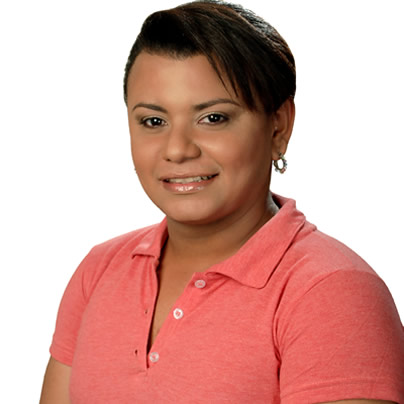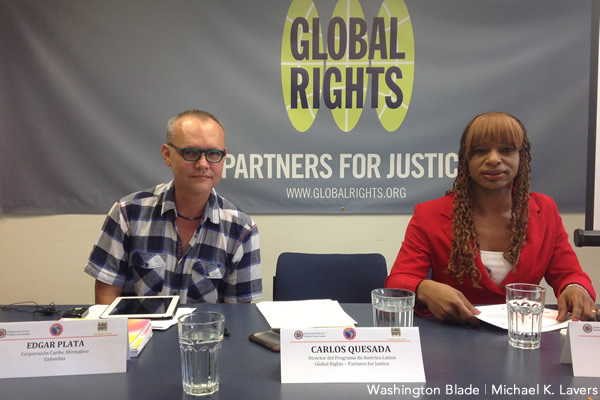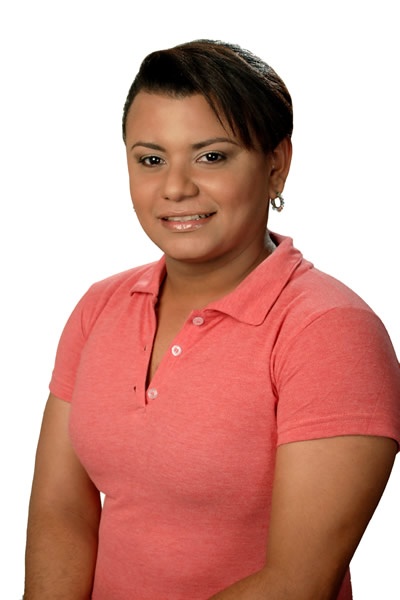News
30 Colombian LGBT advocates attend USAID-backed training
Program seeks to promote greater involvement in country’s politics

Thirty activists from across Colombia are attending a four-day training in the city of Cartagena designed to encourage LGBT people to become more involved in the country’s political process.
The program, which the Gay and Lesbian Victory Institute and the Colombian LGBT advocacy groups Caribe Afirmativo and Colombia Diversa organized, is the second to take place in the South American country as part of the USAID-backed LGBT Global Development Partnership that will contribute $11 million over the next four years to advocacy groups in Ecuador and other developing countries. Thirty activists attended the initiative’s first Colombia training that took place in Bogotá, the country’s capital, from May 30 – June 2.
Denis Dison of the Gay and Lesbian Victory Institute; Claire Lucas of USAID; National Democratic Institute Director Francisco Herrero and Tatiana Piñeros, a transgender woman who runs Bogotá’s social welfare agency, are among those who took part in a panel on Thursday that Colombia Diversa Executive Director Marcela Sánchez moderated on how out political leaders and officials can advance the Colombian and American LGBT rights movements. Jhosselyn Pájaro, a trans woman who ran for municipal council in the city of Arjona outside of Cartagena; Ramón Rojas, a councilman in the city of Chaparral in central Colombia and María Rachid, an Argentine lawmaker and LGBT rights advocate who led campaigns in support of the country’s same-sex marriage and trans rights laws that took effect in 2010 and 2012, also spoke.
“I will have the opportunity to build my capacity and be able to realize a good and better platform in regards to the next campaign,” Pájaro told the Washington Blade before the Cartagena training began. “To know how to implement a good strategy that will allow me to reach my voters is something that excites me greatly.”
The training is taking place roughly five weeks after two gay men in Bogotá became the country’s first legally recognized same-sex couple.
Colombia’s Constitutional Court in 2011 ruled gays and lesbians could seek legal recognition of their relationships within two years if lawmakers in the South American country failed to extend to them the same benefits heterosexuals receive through marriage.
The Colombian Senate in April overwhelmingly rejected a bill that would have extended marriage rights to gays and lesbians.
The Constitutional Court’s June 20 deadline passed amid lingering confusion as to whether same-sex couples could actually marry in Colombia because the 2011 ruling did not contain the word “marriage.”
Sánchez and other LGBT rights advocates consider Carlos Hernando Rivera Ramírez and Gonzalo Ruiz Giraldo married after a Bogotá civil judge solemnized their relationship on July 24. Many notaries have said they will allow gays and lesbians to enter into a “solemn contract” that is similar to an agreement into which two people enter when they purchase a home together as opposed to a civil marriage.
Anti-LGBT violence in Colombia remains a serious problem in spite of efforts to extend relationship recognition to same-sex couples in the country.
Colombia Diversa estimates 58 of the reported 280 LGBT Colombians who were murdered between 2010-2011 were killed because of their sexual orientation or gender identity and expression. A report from the Latin American and Caribbean Network of Transgender Women (REDLACTRANS) notes 61 trans Colombian women have been reported killed between 2005-2011.
Caribe Afirmativo, which works in Cartagena and other cities along Colombia’s Caribbean coastline, documented 79 LGBT residents in the region suffered “violent deaths” since the murder of the organization’s founder, Rolando Pérez, in February 2007. The group also noted 86 incidents of anti-LGBT police harassment during the same period.
Edgar Plata of Caribe Afirmativo, who uses art as a way to advocate in support of LGBT rights, and Alondra Márquez of the Santamaría Fundación, a group based in the city of Cali that advocates on behalf of trans women, discussed violence against LGBT Colombians during a D.C. panel on Aug. 22 that coincided with an Organization of American States meeting on human rights.

Edgar Plata of Caribe Afirmativo and Alondra Márquez of Santamaría Fundación take part in a panel on anti-LGBT violence at Global Rights in Northwest D.C. on Aug. 22, 2013. (Washington Blade photo by Michael K. Lavers)
Caribe Afirmativo Director Wilson Castañeda told the Blade on Thursday that Colombian political parties have yet to include gay-specific issues in their platforms. He added LGBT Colombians who seek to enter politics lack support and money for their campaigns and face what he described as the traditional political class that “functions more like electoral businesses than an ideological process.”
Castañeda added he feels working with the media to create visibility for LGBT Colombians is also important.
“It is important to immediately begin to generate synergies with the parties; with the current elected officials to ensure they, without being LGBT, are open to the idea,” Castañeda said.
Gay and Lesbian Victory Institute President Chuck Wolfe, who spoke on a panel during the Bogotá training, applauded the Cartagena gathering and the LGBT Global Development Partnership.
“This groundbreaking training puts into action the U.S. government’s commitment to global LGBT equality,” he told the Blade. “We are excited to work with our partners in-country and at USAID to grow the domestic participation of the LGBT community in Colombia.”
European Union
European Parliament resolution backs ‘full recognition of trans women as women’
Non-binding document outlines UN Commission on the Status of Women priorities

The European Parliament on Feb. 12 adopted a transgender-inclusive resolution ahead of next month’s U.N. Commission on the Status of Women meeting.
The resolution, which details the European Union’s priorities ahead of the meeting, specifically calls for “the full recognition of trans women as women.”
“Their inclusion is essential for the effectiveness of any gender-equality and anti-violence policies; call for recognition of and equal access for trans women to protection and support services,” reads the resolution that Erin in the Morning details.
The resolution, which is non-binding, passed by a 340-141 vote margin. Sixty-eight MPs abstained.
The commission will meet in New York from March 10-21.
A sweeping executive order that President Donald Trump signed shortly after he took office for a second time on Jan. 20, 2025, said the federal government’s “official policy” is “there are only two genders, male and female.” The Trump-Vance administration has withdrawn the U.S. from the U.N. LGBTI Core Group, a group of U.N. member states that have pledged to support LGBTQ and intersex rights, and dozens of other U.N. entities.
District of Columbia
Deon Jones speaks about D.C. Department of Corrections bias lawsuit settlement
Gay former corrections officer says harassment, discrimination began in 1993

Deon Jones says he is pleased with the outcome of his anti-gay bias lawsuit against the D.C. Department of Corrections that ended after five years on Feb. 5 with the D.C. government paying him $500,000 in a settlement payment.
The lawsuit, filed on his behalf by the American Civil Liberties Union of D.C. and the law international law firm WilmerHale, charged that Jones, a Department of Corrections sergeant, had been subjected to years of discrimination, retaliation, and a hostile work environment because of his identity as a gay man in clear violation of the D.C. Human Rights Act.
A statement released by the ACLU at the time the settlement was announced says Jones, “faced years of verbal abuse and harassment, from co-workers and incarcerated people alike, including anti-gay slurs, threats, and degrading treatment.”
The statement adds, “The prolonged mistreatment took a severe toll on Jones’s mental health, and he experienced depression, post-traumatic-stress disorder, and 15 anxiety attacks in 2021 alone.:
Jones said the harassment and mistreatment he encountered began in 1993, one year after he first began work at the Department of Corrections and continued for more than 25 years under six D.C. mayors, including current Mayor Muriel Bowser, who he says did not respond to his repeated pleas for help.
Each of those mayors, including Bowser, have been outspoken supporters of the LGBTQ community, but Jones says they did not intervene to change what he calls the homophobic “culture” at the Department of Corrections.
The Department of Corrections, through the Office of the D.C. Attorney General, which represents city agencies against lawsuits, and the mayor’s office, have so far declined to comment on the lawsuit and the half million-dollar settlement the city offered to Jones, who accepted it.
Among other things, the settlement agreement states that Jones would be required to resign from his job at the Department of Corrections. It also declares that “neither the parties’ agreement nor the District government’s offer to settle the case shall in any way be construed as an admission by the District that it or any of its current or former employees, acted wrongfully with respect to plaintiff or any other person, or that plaintiff has any rights.”
Scott Michelman, the D.C. ACLU’s legal director said that type of disclaimer is typical for parties that agree to settle a lawsuit like this. He said the city’s action to pay Jones a half million-dollar settlement “speaks louder than words.”
With that as a backdrop, Jones reflected on the settlement and what he says was his tumultuous 30-year career as an employee at the D.C. Department of Corrections in a Feb. 9 interview with the Washington Blade.
He and Michelman pointed out that Jones was placed on paid administrative leave in April 2022, one year after his lawsuit was filed. Among his upcoming plans, Jones told the Blade, is to publish a podcast that, among other things, will highlight the hardship he faced at the Department of Corrections and advocate for LGBTQ rights.
BLADE: What are your thoughts on this lawsuit settlement which appears very much in your favor?
JONES: That’s great. I’m happy. I’m glad to resign. It’s been a long time coming. It was the worst time it’s ever been. And I have advocated for the community for many, many years. And not only standing up for my rights but for the rights for others in the LGBTQ community.
And I’m just tired now. And my podcast will start soon. And I will continue to advocate for the community.
BLADE: Can you tell a little about that and when it will begin?
JONES: Once in April, once everything is closed my podcast will be starting. And that’s Deon’s Chronicle and Reveal. Yes, my own podcast.
BLADE: Since we have reported your attorney saying you have been on administrative leave since March of 2022, some in the community might be interested in what you have been doing since that time. Did you get another job or were you just waiting for this case to be resolved?
JONES: I was waiting for this to be resolved. I couldn’t work. That would violate policy and procedures of the D.C. government. So, I could not get another job or anything else.
BLADE: You have said under administrative leave you were still getting paid. You were still able to live off of that?
JONES: Yes, I was able to. Yes, sir. I used to do a lot of overtime. As a zone lieutenant for many years, I have supervised over 250 officers. I’ve also supervised over 25,000 inmates in my 30 years.
BLADE: How many years have you been working for the Department of Corrections?
JONES: It’s 30 years all together. I started down at the Lorton facility. Six facilities — I’ve worked for past directors, deputy directors, internal affairs. I’ve done it all.
BLADE: Do you have any plans now other than doing the podcast?
JONES: Well, to just do my podcast and also to write my book and my memoir inside of the house of pain, the house of shame — what I’ve been through. When I start my podcast off it will be stories — Part 1 through Part 4. And I will go back to the Lorton days all the way up to now. When it first started was sexual harassment and discrimination back down at Lorton. And I mean this has just been the worst time around.
BLADE: So, did you first start your work at the Lorton Prison?
JONES: Yes, I was at the central facility, which was the program institution.
MICHELMAN: Just for context. You may remember this, but the Lorton facility was where D.C. incarcerated people were held. So, that was part of the D.C. Department of Corrections.
BLADE: Yes, and that was located in Lorton, Va., is that right?
JONES: Right.
BLADE: Didn’t that close and is the main incarceration facility is now in D.C. itself?
JONES: Yes. And that closed in 2001.
BLADE: I see. And is the main D.C. jail now at a site near the RFK Stadium site?
JONES: Yes, sir. And next-door is the correctional treatment facility as well.
BLADE: So, are you saying the harassment and other mistreatment against you began back when you were working at the Lorton facility?
JONES: At the Lorton central facility. And they used to flash me too. When I say flash me like the residents, the inmates were flashing. And they [the employees] were flashing.
BLADE: What do you mean by flashing?
JONES: They take their penis out and everything else. I mean the sexual harassment was terrible. And I came out then down there. And I continued to advocate for myself and to advocate for other people who I was told were being picked on as well.
BLADE: As best you can recall, where and what year did that happen?
JONES: That was back in 1993 in April of 1993.
BLADE: The mayor’s office has declined to comment on the settlement and payment the city is giving you. Yet they have always said they have a strong policy of nondiscrimination protections for LGBTQ people in D.C. government agencies. But do you think that was not carried out at the Department of Corrections?
JONES: That’s a blatant reason why — I had 13 anxiety attacks. It was so blatant. Can you imagine? On the airwaves or the walkie-talkies — everybody had a walkie talkie — the captains and the majors and everything. And you transmit it to the command center or something like that. When you finish someone gets on the air and calls you a sissy or a fag.
They received so many complaints, and I also sent the mayor so many emails and begging for help. And they ignored it. They didn’t address any complaints at all. So, that’s bull.
BLADE: But now after you filed your lawsuit and you received this settlement do you think there will be changes there to protect the rights of other LGBTQ employees?
JONES: I hope so, because I have been defending community rights. For many years I have been advocating for different things and different services. And I’ve seen the treatment. There are a lot of mistreatments towards the community over there. And I have taken a stance for a lot of people in the community and protecting their constitutional rights as well as mine.
BLADE: What advice might you have for what the Department of Corrections should do to correct the situation that led to your lawsuit?
JONES: Well, what my advice for the department is they need to go back over their training. And they need to enforce rules against any acts of discrimination, retaliation, or sexual harassment. They need to enforce that. They’re not enforcing that at all. They’re not doing it at all. And this time it was worse than ever, then I’ve ever seen it. That you would get on the walkie talkie and someone would call you a fag or a sissy or whatever else or do evil things and everything. They are not enforcing what they are preaching. They are not enforcing that.
BLADE: Is there any kind of concluding comment you may want to make?
JONES: Well, I hope that this litigation will be a wakeup call for the department. And also, that it will give someone else the motivation to stand up for their rights. I was blessed to have the ACLU and WilmerHale to protect my constitutional rights. So, I am just really happy. So, I’m hoping that others will stand up for their rights. Because a lot of people in the community that worked there, they were actually afraid. And I had some people who actually quit because of the pressure.
Baltimore
‘Heated Rivalry’ fandom exposes LGBTQ divide in Baltimore
Hit show raises questions about identity, cultural representation

By JOHN-JOHN WILLIAMS IV | “Heated Rivalry,” the surprise gay hockey romance that has captivated global audiences and become a cultural phenomenon, has inspired sold-out parties celebrating the characters from the steamy series, including in Baltimore.
For some, love of the show has exposed the loss of a once-vibrant gay nightlife in Charm City and splintered its LGBTQ community. It also brings up layered questions about identity, cultural representation, and the limits of identity politics.
In Baltimore, the majority of the parties also appear to be missing a key ingredient that has been a part of the show’s success: gay men at the helm. Last month, women hosted a dance party at Ottobar, a straight establishment.
The rest of this article can be read on the Baltimore Banner’s website.




















